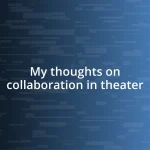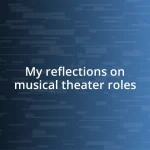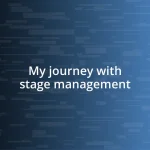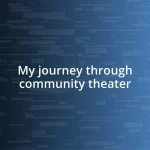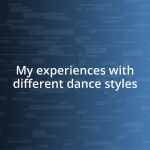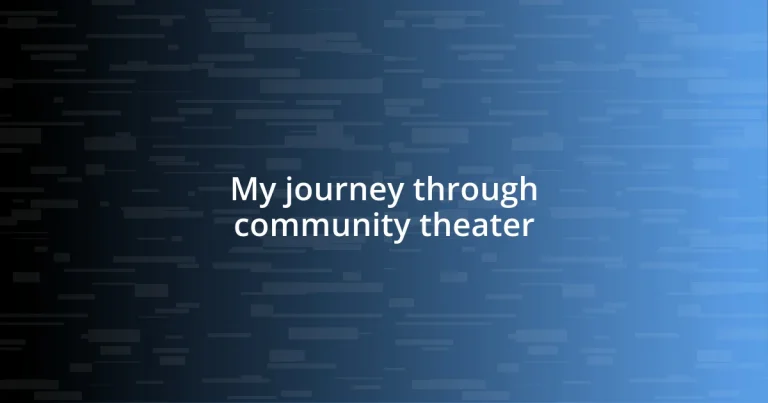Key takeaways:
- Community theater fosters inclusivity, allowing individuals of all skill levels to connect and grow creatively together.
- Performing arts encourages emotional expression and authenticity, leading to personal growth and transformative experiences.
- Strong relationships and collaboration among fellow actors enhance the theater experience, creating lasting friendships and support systems.
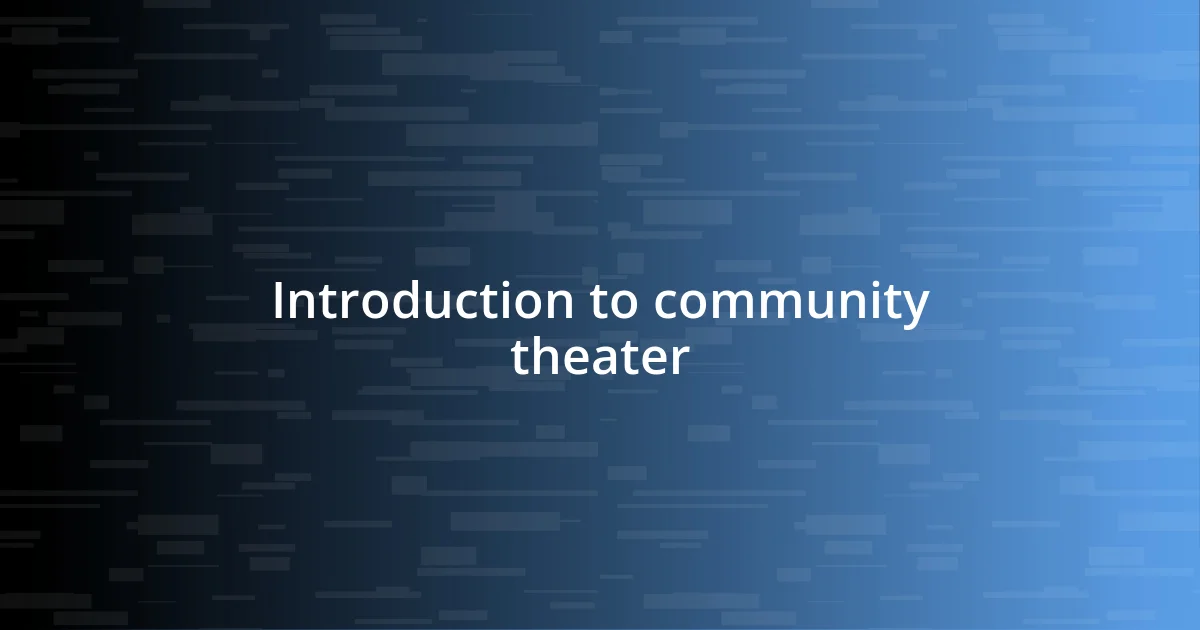
Introduction to community theater
Community theater is a vibrant and essential part of the arts landscape, bringing together individuals from all walks of life to share the magic of performance. I remember my first experience in a local production; the excitement was palpable as we transformed an empty stage into a world of creativity and expression. Isn’t it fascinating how such a simple endeavor can forge lasting connections among cast and crew?
In my journey through community theater, I’ve witnessed the power of storytelling firsthand. It creates a unique bond between performers and audiences, offering insights into different lives and perspectives. Have you ever found yourself empathizing with a character and reflecting on your own experiences? This emotional resonance is what makes community theater so compelling—a mirror held up to society that invites conversation and connection.
The beauty of community theater lies in its inclusivity; anyone can participate, regardless of skill level. I recall a fellow cast member who had never acted before our production. Watching them blossom and find their voice was not just inspiring but a testament to the nurturing environment that community theater fosters. Have you ever felt that thrilling rush of stepping out of your comfort zone? That’s the heartbeat of community theater, where magic happens when we embrace our vulnerabilities together.
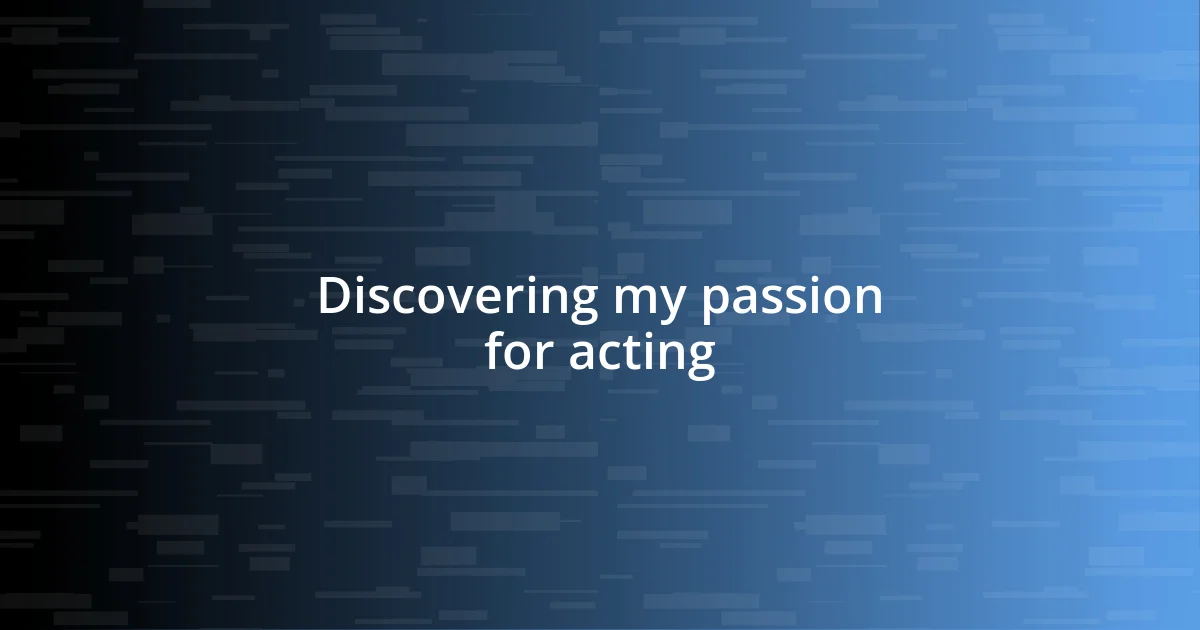
Discovering my passion for acting
I still remember the first time I stepped onto the stage. The lights, the audience, and the palpable energy were exhilarating. It felt like all my worries melted away. I discovered that acting wasn’t just about performing; it was about embracing a different persona and telling a story. Have you ever felt that sense of liberation when doing something you love? For me, acting became a thrilling escape.
As I dived deeper into community theater, I began to understand the transformative power of performance. Each rehearsal was a journey; I found myself pouring my emotions into a character, reflecting my own experiences. I recall a scene where I had to portray heartache, and suddenly, I was reliving my own past struggles. It’s incredible how art can evoke and channel such raw feelings. Have you ever experienced that cathartic release when expressing deep emotions on stage?
In every performance, I’ve learned that authenticity is key. I can’t tell you how many times I stood backstage, my heart racing, grappling with nerves before a show. But once I stepped into the spotlight, all that jitteriness faded; I became part of something larger than myself. It’s within those moments that I discovered my true passion for acting, where shared stories unite us. Have you experienced that powerful connection in your own passions?
| Experience | Emotion |
|---|---|
| First time on stage | Excitement, liberation |
| Transformative power of performance | Heartfelt reflection, connection |
| Authenticity in acting | Nerves turned into unity |
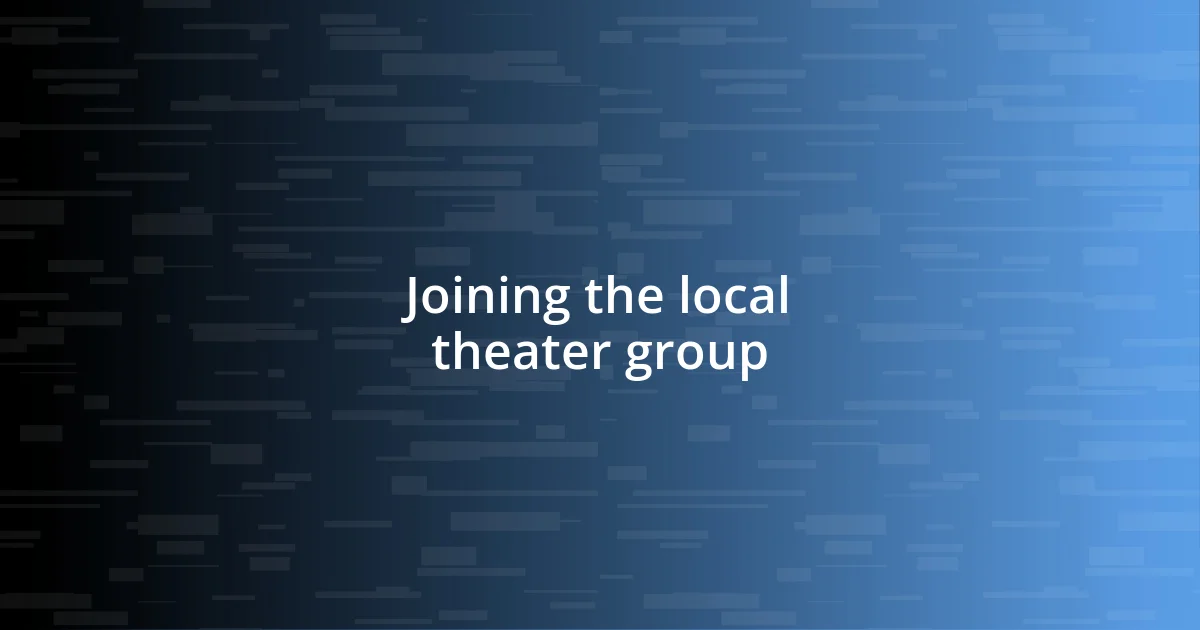
Joining the local theater group
Joining the local theater group felt like stepping into a new, exciting world. The first day I walked into rehearsal, I was welcomed with open arms by a diverse group of individuals, each with their own stories and experiences. It was a reminder of how theater is more than just acting; it’s about finding a sense of belonging and community.
When I think back to that initial meeting, my nerves were palpable. I sat among seasoned actors, yet I quickly learned that everyone had started somewhere. Here are some of the standout aspects of my experience:
- Diverse Skill Levels: People of all backgrounds and abilities came together, ensuring no one felt out of place.
- Warm Atmosphere: The environment was supportive, encouraging everyone to express themselves freely.
- Shared Goals: We all aimed to create something special, which fostered camaraderie and friendship quickly.
- Mentorship: Seasoned members were eager to share their knowledge, providing invaluable guidance without judgment.
As rehearsals progressed, I felt my confidence grow. We bonded over shared laughs and bloopers, creating lasting memories that went beyond the stage. I distinctly remember the first time our director encouraged us to improvise during a scene; I was terrified yet exhilarated. That moment taught me that theater isn’t about perfection—it’s about vulnerability, connection, and creativity.
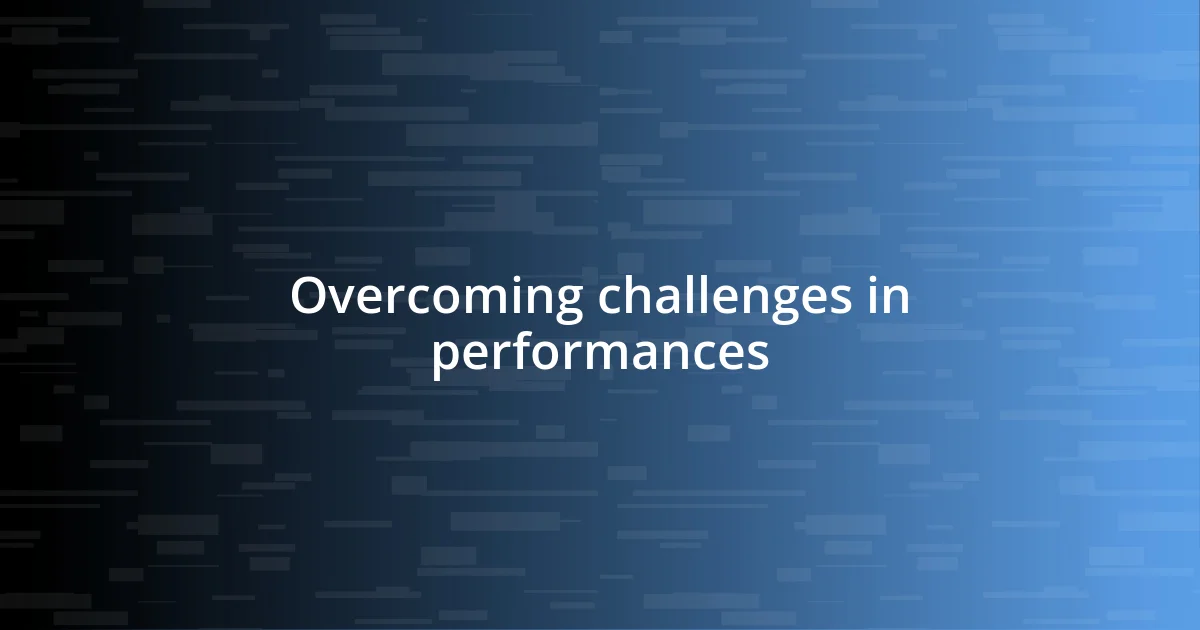
Overcoming challenges in performances
One of the biggest challenges I faced during performances was dealing with unexpected mishaps. I vividly recall a night when a prop went missing just minutes before we were set to go onstage. My heart raced as I imagined the audience’s reaction. But instead of panicking, I learned to quickly adapt, creating an impromptu solution that not only saved the scene but added an unexpected twist. Have you ever had to think on your feet in a high-pressure situation?
Nerves often accompany performance, manifesting in a way that can feel overwhelming. I remember a particularly nerve-wracking opening night, where every doubt flooded my mind right before stepping on stage. Yet, I discovered that embracing those feelings transformed them into energy. I began to channel that nervousness into my character’s intensity, and suddenly, I was on fire. Isn’t it fascinating how fear can sometimes ignite our best performances?
Working as part of a team in theater means you’ll encounter challenges in communication and collaboration. There was a moment during rehearsal when tensions flared over a creative difference. Instead of letting it fester, our director encouraged an open dialogue, allowing us to express our thoughts and feelings. That experience taught me that conflict can lead to growth if approached with understanding. Have you ever found that a disagreement led to a stronger connection or a better outcome?
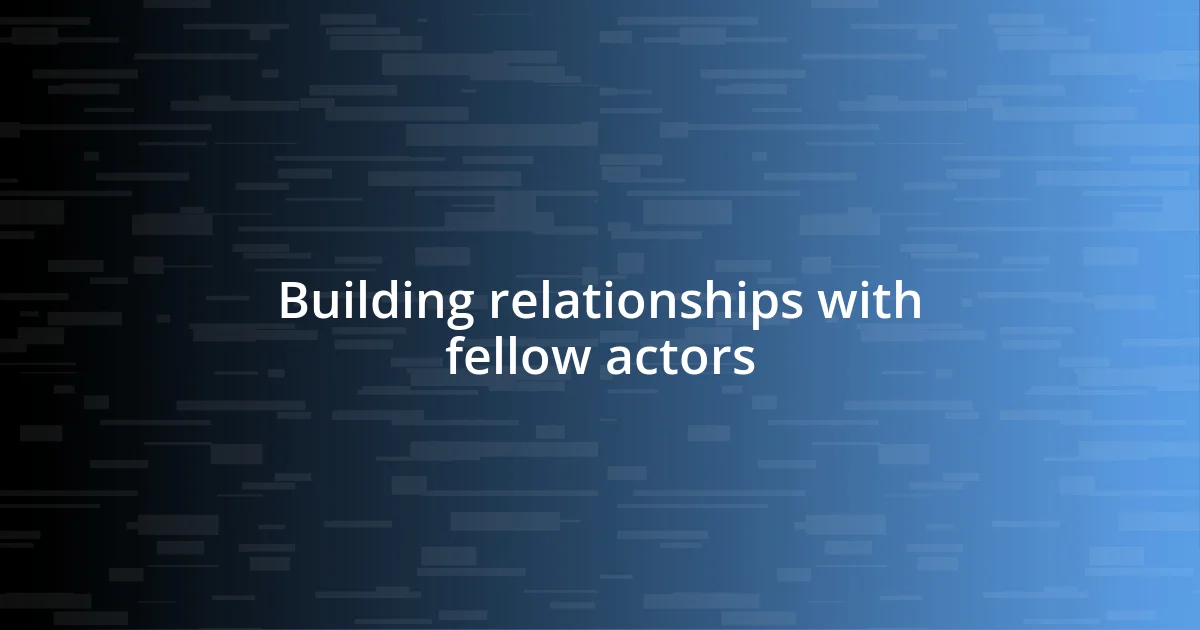
Building relationships with fellow actors
Forming genuine relationships with fellow actors is one of the most rewarding aspects of community theater. I remember one afternoon during a grueling rehearsal when we all decided to take a break and grab coffee together. As we shared personal stories and favorite roles, it struck me how these candid moments of vulnerability helped us connect on a deeper level. Hasn’t there been a time when opening up to someone unexpectedly strengthened your bond?
The beauty of theater collaboration is that it often fosters friendships that go beyond the stage. I think back to the times we would stay late to help each other with lines or troubleshoot scenes. It’s interesting how those late-night rehearsals turned into laughter-filled sessions that forged strong support systems. Isn’t it amazing how shared challenges can lead to a sense of family?
My favorite memories include our yearly cast parties, where we celebrated not just our victories, but the incredible journey we had together. On one such occasion, we created a “memory wall” filled with photos and quotes from our rehearsals. It made me realize that these relationships were more than just connections for a play; they were meaningful friendships built on trust and shared passion. How often do we get to look back and see how far we’ve come together?
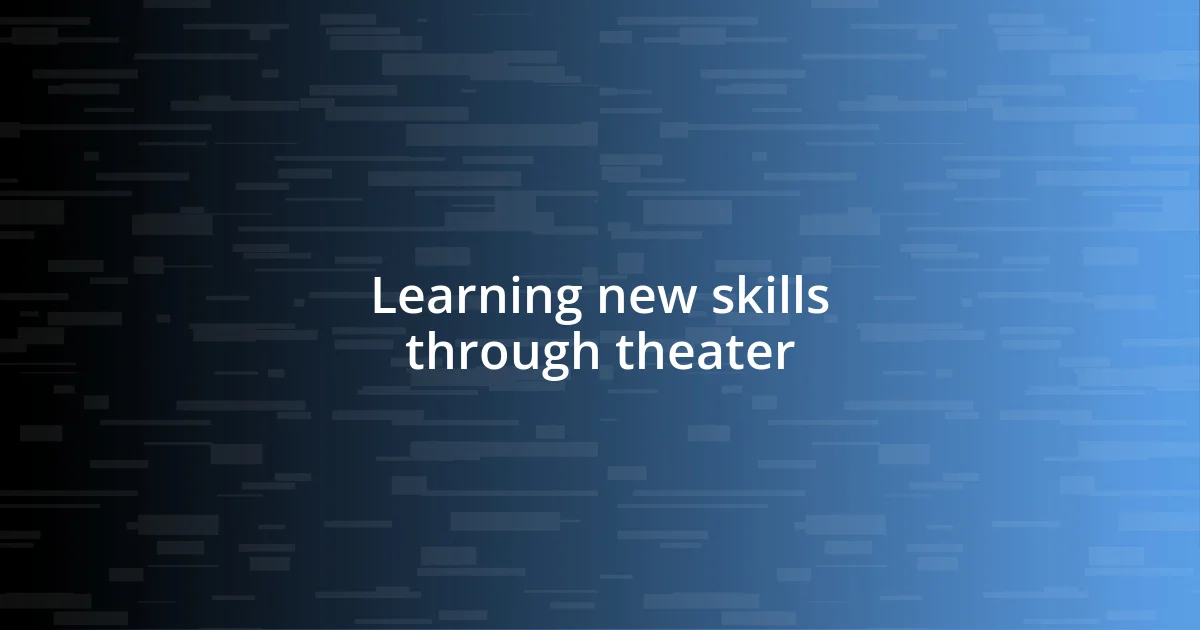
Learning new skills through theater
Theater has been a profound avenue for me to cultivate various skills, often in the most unexpected ways. I recall my first time reading lines in front of an audience; my voice trembled, and I could barely project. Yet, with each performance, I learned not just to speak, but to convey emotion, to embody a character’s essence. Have you ever experienced that moment when you realize you’re not just acting, but truly connecting?
One of the most unexpected skills I developed was time management. Balancing rehearsals with work and personal commitments felt daunting at first. There was a night when, in a panic, I forgot my lines and lost track of time at the office. However, I quickly realized that I needed to prioritize my schedule, carving out specific blocks of time for practice. This discipline paid off—what initially felt like chaos morphed into a rhythm. Isn’t it incredible how art can teach us about managing life?
Emotional expression became a pivotal skill as well. I remember a particular scene where I had to dredge up deep feelings of loss. At first, it felt forced, like I was reaching for something I couldn’t grasp. Yet, through that process, I discovered the power of vulnerability and how it can resonate with an audience. Have you found that tapping into your emotions not only helps in performance but also in daily interactions?
